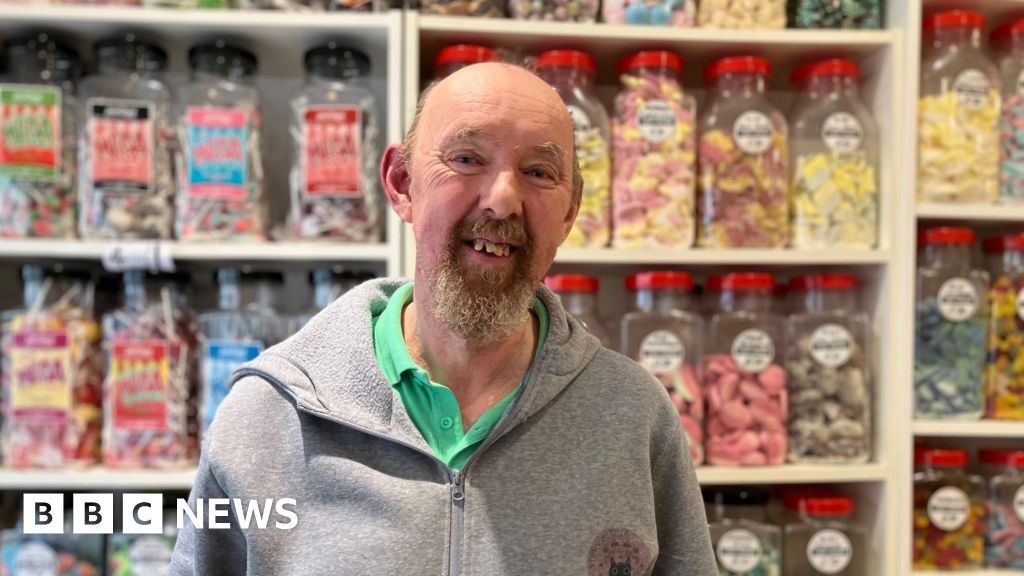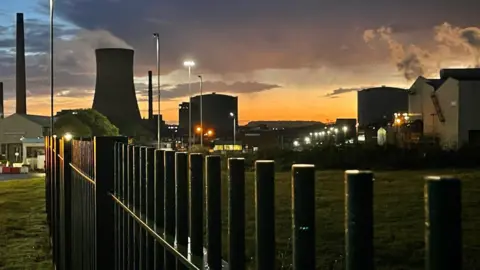Scunthorpe: Businesses fear potential steel job losses

By Lucy Parry, BBC Yorkshire and Lincolnshire investigations
 BBC
BBCSteel workers, their families, and small businesses say their lives are on hold as the threat of significant job losses at Scunthorpe steelworks continues to hang over them.
As part of a £1.25bn decarbonisation plan, British Steel would close the plant’s two blast furnaces, replacing them with a greener electric arc furnace.
Trade unions said the move would result in 2,000 redundancies in steel and iron making.
The new Labour government said it would be working to safeguard jobs as part of its negotiations with British Steel, which also said it would support affected employees.
 Jessica Lane/ BBC
Jessica Lane/ BBCAround a quarter of the workforce in Scunthorpe is employed in manufacturing – including 4,000 at British Steel, according to North Lincolnshire Council.
And much of the private sector is involved in logistics and supply chains for the plant.
That worries those in the hospitality and leisure industry, who depend on disposable incomes, including Stuart Ross, the owner of Ashby Bowl in Scunthorpe.

Mr Ross said a lot of his customers were steel workers, or connected to the steel works in some way: “They’re very worried. People are coming up to retirement age and they don’t know what is going to happen to them.
“If they haven’t got the money, they won’t spend. That will be the entertainment industry, the leisure industry. Everything, everything will be affected.
“It could be a town killer.”

As Steve Barnes scooped fizzy cola bottles into a bag at his High Street sweet shop, he remembered what it was like to lose his job at the steel works: “It was absolutely gutting at the time and it’s going to be the same for these people.”
Mr Barnes was one of 4,000 steel workers made redundant in 1981, when large parts of the Scunthorpe plant were shut down.
He said his business is going well, for now: “We’re riding on a little bit of a crest of a wave because sweets are almost fashion because of Tik Tok, but it’s only good while people have got money.”
He is worried customers will cut back on treats: “The steel works provide many of the better paid jobs in Scunthorpe, so obviously it’s a huge chunk of spending power coming out of the town.”
Green steel making
British Steel said replacing Scunthorpe’s blast furnaces with an electric arc furnace, would help with its Low Carbon Roadmap, which aims to deliver net-zero steel by 2050.
However, the move depends on what its Chinese owner, Jingye, described as “appropriate support” from the UK government, widely reported to be a request for £300m in subsidies.
As negotiations continue, business secretary, Jonathan Reynolds said: “Steel is vital for a vibrant, secure economy.
“Our steel sector needs a government working in partnership with trade unions and business to secure a green steel transition that’s both right for the workforce and delivers economic growth.
“Decarbonisation does not mean deindustrialisation, and I will be working to safeguard jobs as part of these negotiations, securing the future of steelmaking communities for generations to come.”
British Steel said it would support employees affected by its plans, adding: “The new government is well-briefed on the challenges our business faces, and the timely support we require for decarbonisation.
“We look forward to working together to build a clean, green, and sustainable future for British Steel.”
 Simon Spark/BBC
Simon Spark/BBCMeanwhile, Scunthorpe’s Labour MP, Sir Nic Dakin, said he was concerned about the closure of the blast furnaces:
“What the Labour party made clear during the election period was that we wish to retain primary steel making capacity in the UK.
“There’s no reason that couldn’t be retained here in Scunthorpe where we’ve got good blast furnaces and obviously there needs to be a move to cleaner, greener technology over time, but these are the discussions that need to take place.
“What we need is a sensible transition and we may be able to retain the blast furnaces for way longer than was envisaged in the plans that are being talked about.”

The Federation of Small Businesses’ regional development manager, Paula Gouldthorpe, said support must be there for those facing redundancy.
She added: “Some might look for alternative roles, some might take the decision to look at starting their own business, and I think for the local authorities and for the government, it’s really important to look at that wider package of support.”

Jamie Stringer works in the continuing casting section of the works: “We take liquid steel and make it into hard steel, it gets rolled into different products like rails.”
Like many others, his family came to Scunthorpe because of steel: “My grandad travelled down from London in the 60s to work in the plant, so it runs in the family.
“I did an apprenticeship and have been there about 19 years now.”
He said morale was low because of the uncertainty: “People are just after answers really and want to know what’s happening with blast furnaces, because they are a major part of the steel plant.”

But Prof Ian Barnes, from the University of Lincoln’s school of economics, believes Scunthorpe can cope with yet more change: “When you think that 40 odd years ago, you had 30 odd thousand people working in the steel industry, it’s adjusted very well to the current situation.
“One of the great things about Scunthorpe, it’s got good connections to the road and railway network.
“It’s got a lot going for it, provided it gets the right kind of jobs coming in over time, but it will be an adjustment period.”
Related
Llyods Recruiting Engineers In India After Slashing Jobs In UK
Lloyds Banking Group is planning to hire hundreds of engineers in India as the company plans to shift its employment opportunit
Major new funding for music acts that supercharged careers of…
£1.6m Music Export Growth Scheme to support 58 independent UK artists to tour the world Funding will boost UK’s creative industries – a key growth se
Well-loved restaurant chain to close 8 venues across UK as…
A BELOVED restaurant chain has announced it will close eight venues across the UK, scrapping 158 jobs in the process.Owners are pointing the finger at Labour's
US adds 151,000 jobs in February as unemployment rate ticks…
The latest figures published by the US Bureau of Labor Statistics today (7 March) came in below market expectations, with economists polled by













